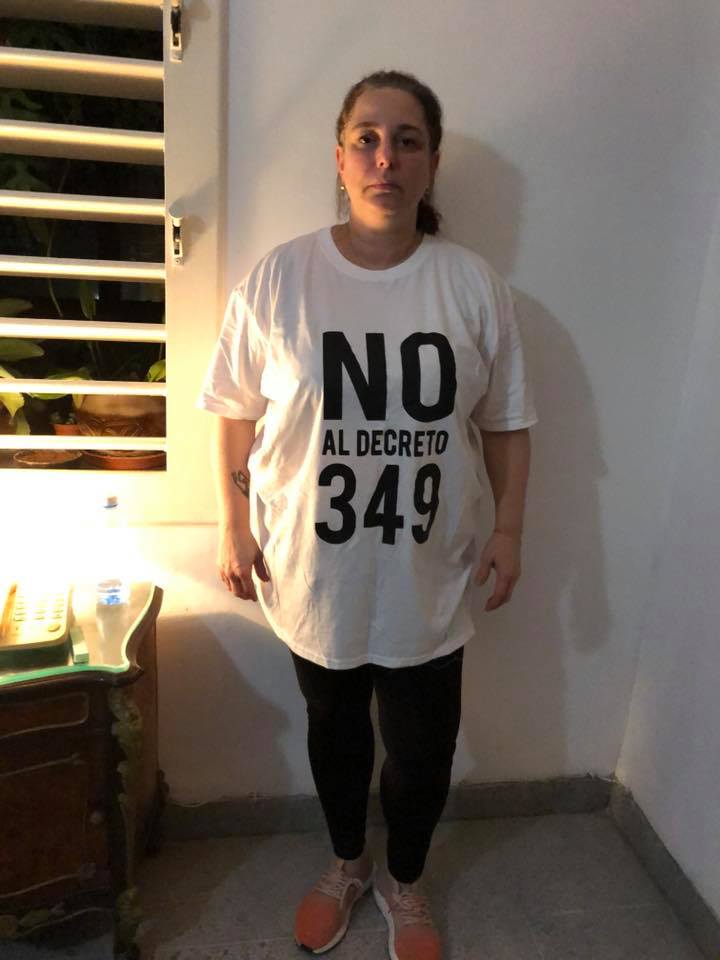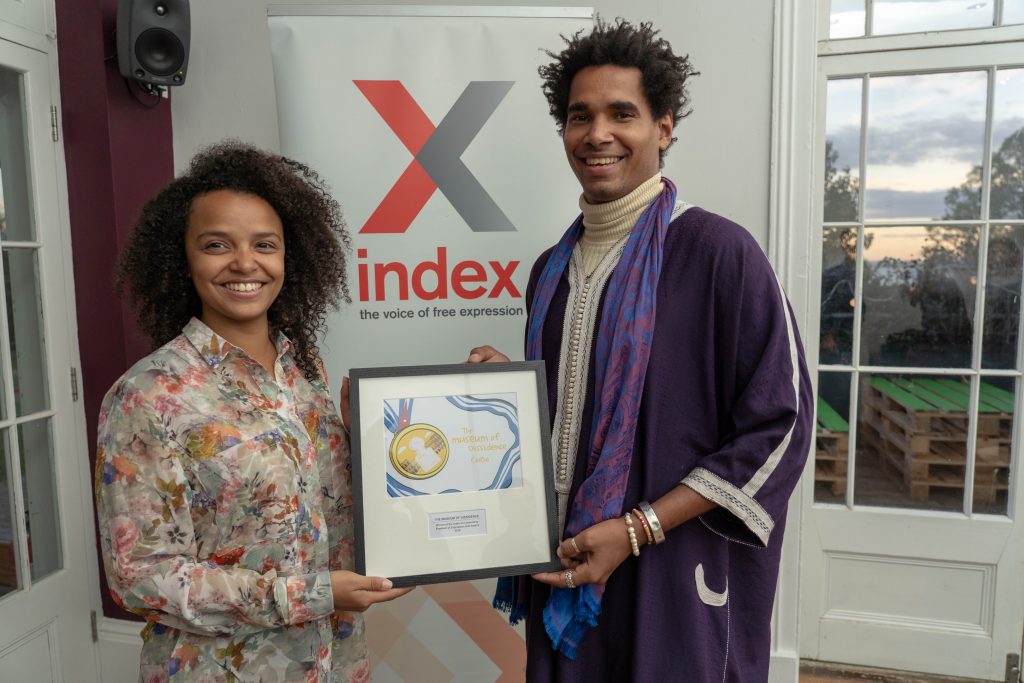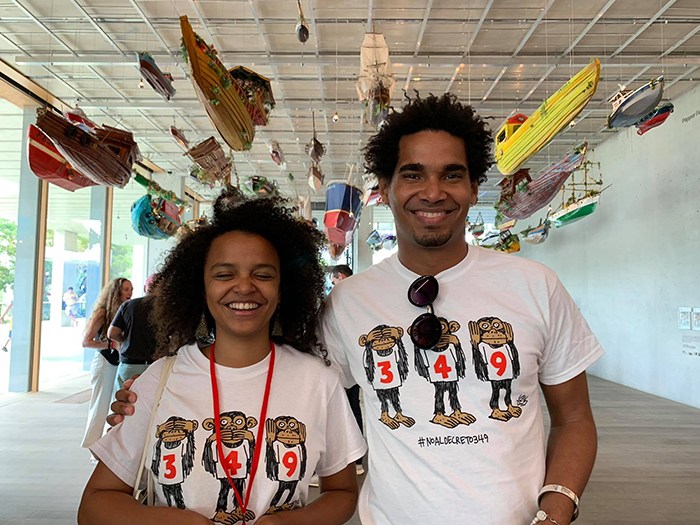Index relies entirely on the support of donors and readers to do its work.
Help us keep amplifying censored voices today.
[vc_row][vc_column][vc_column_text]

Cuban artist Tania Bruguera
Update: All arrested artists have now been released, although they remain under police surveillance. Cuba’s vice minister of culture Fernando Rojas has told the Associated Press that changes will be made to Decree 349 but has not opened dialogue with the artists involved in the campaign against the decree.
The following is an open declaration for all artists campaigning against the Decree 349, a law that will criminalise independent artists and place severe restrictions on cultural activity not authorised by the state. It will be read in solidarity at a gathering at Turbine Hall at the Tate Modern today from 1-2pm for those arrested this week for protesting the law. Those arrested include Luis Manuel Otero Alcantara and Yanelys Nuñez Leyva, members of the Index-award winning Museum of Dissidence, and Cuban performance artist Tania Bruguera. In all, 13 artists were arrested over 48 hours. Some have commenced a hunger and thirst strike.
The Cuban government intends to implement a regulation – commonly known as Decree 349 – which will subdue artistic and creative activity on the island, bringing it under the state’s strict tutelage. The content of the decree comprises two classical premises of any totalitarian state: the need for the artist to obtain prior authorisation for the exercise of his/her work and censorship of the creative process.
The execution of these two premises is to be overseen by an intricate structure of civil servants, subject to their discretion, thus reinforcing a “bureaucracy” which inhabits the language of revolutionary self-criticism.
The title of the decree reflects the particular vision that the Cuban government has about art because it refers to “the provision of artistic services”. If the purpose of art is to provide a service, then it essentially provides only to the regime and to no one else.
Art as a utilitarian artefact not only contravenes the Universal Declaration of Human Rights (Cuba is an active member of the United Nations Organisation), but also the basic principles of the United Nations for Education, Science and Culture (UNESCO).
The decree does not include anything new to the current practice of the Cuban government in the management of social engineering of its population, however, it offers a legal cover to a reactionary, ancient and regressive practice even in the field of those who consider themselves progressive. Nobody can deny the extraordinary achievement of Cuba in terms of providing basic necessities to its citizens, particularly provisions of health and education; this in spite of a setback of over fifty years, resulting from a political and economic embargo from the world’s most powerful nation. Under these conditions, creatives in Cuba were not only free to practice art but were actively promoted by the State and became a symbol of a global solidarity.
Ultimately, the freedom that is inherent to creative acts is something that a government whose only objective it is to remain in power, will be unable to tolerate. In adopting the act and implementing the decree, they will find themselves in a creative desert that will bore even themselves. The nomenclature living in their material comfort will seek to see Hollywood movies, instead of listening to their own propaganda.
Freedom of creation, a basic human expression, is becoming a “problematic” issue for many governments in the world. A degradation of fundamental rights is evident not only in the unfair detention of internationally recognised creatives, but mainly in attacking the fundamental rights of every single creator. Their strategy, based on the construction of a legal framework, constrains basic fundamental human rights that are inalienable such as freedom of speech. This problem occurs today on a global scale and should concern us all.[/vc_column_text][/vc_column][/vc_row][vc_row][vc_column][vc_basic_grid post_type=”post” max_items=”4″ element_width=”6″ grid_id=”vc_gid:1544094682847-9507be49-72bf-3″ taxonomies=”23772″][/vc_column][/vc_row]
[vc_row][vc_column][vc_column_text]

Yanelys Nuñez Leyva and Luis Manuel Otero Alcántara. The Museum of Dissidence
2018 Freedom of Expression Awards at Metal, Chalkwell Park, Essex.
Update: All arrested artists have now been released, although they remain under police surveillance. Cuba’s vice minister of culture Fernando Rojas has told the Associated Press that changes will be made to Decree 349 but has not opened dialogue with the artists involved in the campaign against the decree.
Index on Censorship calls for the immediate release of Cuban artists protesting against a decree they say could stifle creativity and increase censorship.
Members of the 2018 Index on Censorship Freedom of Expression Award-winning Museum of Dissidence, Luis Manuel Otero Alcantara and Yanelys Nuñez Leyva, are among those arrested and whose whereabouts are currently unknown. Performance artists Tania Bruguera was also detained.
Index fears for the artists’ well-being following reports of threats of violence by state security. There is a heavy police presence at the homes of artists who said they would be participating in the peaceful protest in front of the Ministry of Culture.
Otero Alcàntara and Nuñez Levya couldn’t make it to the Index awards ceremony in April but were in the UK to finally receive their award on 18 October at Metal arts centre in Chalkwell Hall, Southend. The Museum of Dissidence, a public art project celebrating dissent in Cuba, has constantly faced opposition, criticism and imprisonment for its art and activism.
“Luis Manuel and Yanelys have made clear that they want dialogue with the government to repeal this decree and include independent artists in the decisions that affect them. Criminalising art should never be an option. We call for the artists’ immediate release,” said Index on Censorship CEO Jodie Ginsberg.[/vc_column_text][/vc_column][/vc_row][vc_row][vc_column][vc_basic_grid post_type=”post” max_items=”4″ element_width=”6″ grid_id=”vc_gid:1544094896838-be240ea9-89bc-10″ taxonomies=”23772″][/vc_column][/vc_row]
[vc_row][vc_column][vc_column_text]

Yanelys Nuñez Leyva and Luis Manuel Otero Alcantara
Update: All arrested artists have now been released, although they remain under police surveillance. Cuba’s vice minister of culture Fernando Rojas has told the Associated Press that changes will be made to Decree 349 but has not opened dialogue with the artists involved in the campaign against the decree.
Cuban artists Luis Manuel Otero Alcantara and Yanelys Nuñez Leyva, members of the Index-award winning Museum of Dissidence, were arrested in Havana on 3 December for protesting against Decree 349, a law that will criminalise independent artists and places severe restrictions on cultural activity not authorised by the state. Their location was unknown until 4 December when it became clear they were taken to Vivac prison on the outskirts of Havana.
The performance artist Tania Bruguera was arrested separately, released and then rearrested. In all, 13 artists were arrested over 48 hours. Some have commenced a hunger and thirst strike.
There are reports of artists, including theatre actors, being unable to attend the protest due to a police presence at their homes. There are also reports of artists being threatened by state security with being thrown off buildings and with having their phones confiscated and broken.
Before his arrest, Otero Alcantara told Index: “349 is the image of censorship and repression of Cuban art and culture, and an example of the exercise of state control over its citizens.”
“Index on Censorship condemns the arrests of Luis Manuel Otero Alcantara, Yanelys Nuñez Leyva and Tania Bruguera, and demands their immediate and unconditional release,” says Jodie Ginsberg, CEO of Index on Censorship. “The arrests of those engaging in peaceful protest against a law that limits artistic freedom is completely unacceptable.”
Decree 349 will come into force on 7 December. Otero Alcantara visited London on 26 October where he protested in Trafalgar Square in flamboyant carnival attire as his character Miss Bienal against the draconian law. He told Index of his surprise at being allowed to demonstrate in a public area without interference from the authorities: “People stop and stare, you know, but police don’t arrest me. It is strange because this wouldn’t happen in Cuba.”
Otero Alcantara has been arrested on numerous occasions in Cuba, including in July for protesting Decree 349 outside the Ministry of Culture, and in August, along with Nuñez Leyva, for organising an anti-censorship concert.[/vc_column_text][/vc_column][/vc_row][vc_row][vc_column][vc_basic_grid post_type=”post” max_items=”4″ element_width=”6″ grid_id=”vc_gid:1551353027371-75b2196d-f44a-10″ taxonomies=”23772″][/vc_column][/vc_row]
[vc_row][vc_column][vc_single_image image=”103502″ img_size=”full” add_caption=”yes”][vc_column_text]Award-winning Cuban artist Luis Manuel Otero Alcantara donned flamboyant carnival attire as he unleashed his character Miss Bienal upon an unsuspecting Trafalgar Square on 26 October to protest against Decree 349, a law which threatens artistic expression in Cuba.
Expressing his surprise at being allowed to demonstrate in a public area without interference from authorities, he said: “People stop and stare, you know, but police don’t arrest me. It is strange because this wouldn’t happen in Cuba.”
Previously Alcántara was arrested for organising a concert against Decree 349, alongside Yanelyz Nuñez Leyva. If imposed on December 1, the law will see Cuba’s Ministry of Culture gain more power to censor art, issue fines and confiscate materials.
His character, Miss Bienal, takes inspiration from dancers of the famous Tropicana Cabaret and cliches about Cuba. He plans to perform as Miss Bienal around the world, and could recently be found parading the streets of Madrid.
Sue Bingham, country coordinator for Cuba at Amnesty International, was on hand to show her support. She said: “It’s important for the Cuban artists to be here today in Trafalgar Square because this is such an iconic place in London and they wanted to make sure that they bring their message to the very heart of the UK.”
Alcántara and Nuñez run the Museum of Dissidence, a public art project celebrating dissent in Cuba, and were the recipients of the 2018 Index on Censorship Freedom of Expression Awards Fellowship for Arts. The activists finally received their accolades earlier this month after a seven-month battle to gain entry into the UK. The intimate ceremony was held at Metal arts centre in Chalkwell Hall, Southend.[/vc_column_text][vc_basic_grid post_type=”post” max_items=”12″ style=”load-more” items_per_page=”4″ element_width=”6″ grid_id=”vc_gid:1540980270804-460204da-ed5a-7″ taxonomies=”23772″][/vc_column][/vc_row]